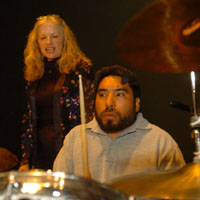 Teresa Kellerman has spent 28 years educating herself about the
disorder that ravaged her adopted son's brain.
Teresa Kellerman has spent 28 years educating herself about the
disorder that ravaged her adopted son's brain.
Tucson Citizen
Saturday, February 25, 2006
Mom takes expertise to help others across Az
Pinpointing the cost of fetal alcohol
GABRIELLE FIMBRES
gfimbres@tucsoncitizen.com
 Teresa Kellerman has spent 28 years educating herself about the
disorder that ravaged her adopted son's brain.
Teresa Kellerman has spent 28 years educating herself about the
disorder that ravaged her adopted son's brain.
John was diagnosed at birth with fetal alcohol syndrome, the leading preventable cause of mental retardation in the United States.
"As devastating as his outcome was, we have been able to get him what he needs," she said.
Through early identification, children with FAS are more likely to thrive, and less likely to end up in prison, mental institutions or homeless on the streets, Kellerman said.
She is taking that message statewide, helping families and professionals understand FAS and related fetal alcohol spectrum disorders, as the new FASD coordinator for the Arizona Division of Developmental Disabilities.
She is determining how many adults and children in the state system have FAS and FASD. She will train caseworkers to identify FASD and provide services that make the greatest impact.
"This is a part of my dream," Kellerman said.
FAS was first diagnosed in 1973.
It occurs when women drink alcohol during pregnancy.
Even moderate amounts of alcohol in pregnancy have been found to cause brain damage.
Children with FASD suffer from learning disabilities, mental health issues, poor impulse control and mood disorders. The problems continue into adulthood.
"Doctors continue to tell their pregnant patients it's OK to have a drink or two," Kellerman said. "But any drink a woman takes destroys some of the child's potential."
No cure has been found for FASD, but Kellerman knows she can improve people's lives through early identification.
Early detection could have made a difference for John Eastlack, who spends his days locked in an Arizona prison for a crime that may have started in the womb.
Eastlack, 38, has FAS. As a child, his troubles were blamed on his poor choices. By the time he was diagnosed, he was in prison for a double-murder.
Eastlack is among the estimated 55 percent of men with FAS who end up incarcerated.
His adoptive mother, Tucson psychologist and author Katherine Norgard, wants to spare other parents the devastation caused by FAS.
"Rather than dealing with FAS issues early on, we're locking people up," said Norgard, whose book, "Hard to Place: A Crime of Alcohol" was released last month.
Kellerman estimates 10 percent of the 25,000 people in the state developmental disabilities system may have FASD.
Ric Zaharia, who heads the Arizona system, said this is the first time a count has been attempted.
"We have no way of knowing what the number is," Zaharia said. "We've never looked at it. Mental retardation is often, but not always, a result of FAS, but folks don't carry that diagnosis.
"We can most easily stop mental retardation if we can get people to stop drinking in pregnancy," he said.
Diagnosing FAS and FASD can be difficult.
People with FAS are small, have central nervous system damage and distinct facial characteristics.
Those with FASD may not have the physical characteristics, but have all the social and emotional problems.
But the vast majority of people with FASD don't qualify for government services.
Just the most drastically impaired, with IQs below 70, do.
Others founder through school and life.
Many end up incarcerated, jobless and unable to care for themselves, Kellerman said.
Her son is a constant reminder of the importance of prevention and intervention.
Kellerman has been a lifelong advocate for her son, who works at Desert Survivors Nursery, 1020 W. Starr Pass Blvd., and lives with his sister Kari, 31. Kari, who was also adopted, has Prader-Willi syndrome, a genetic disorder that results in damage to the central nervous syndrome and an insatiable appetite.
The two live in their own home, with constant supervision provided by the state.
John Kellerman's favorite time of the week comes on Sundays, when he plays drums at St. Paul's United Methodist Church, 8051 E. Broadway. His mom sings with the band.
He has always known his birth mother's drinking in pregnancy made him different.
Kellerman remembers seeing the tiny, sickly baby in a hospital crib, and falling in love.
"He was scrawny, he was skinny, he didn't look done yet," recalled Kellerman of the first time she saw him.
"I saw him and thought, 'This is my baby. I'm going to take him home and love him and give him everything he deserves.' "
FAS facts
Fetal alcohol syndrome is the top preventable cause of mental retardation in the United States. Alcohol causes more damage to an unborn child than cocaine, heroin or any other drug.
• More than 11,000 babies are born in Arizona each year to women who engaged in binge drinking during pregnancy.
• About half of all babies are conceived by women who drink.
• As high as 90 percent of children in foster care were exposed to alcohol in the womb.
• The annual cost to U.S. taxpayers for FAS is $5.8 billion. The cost to Arizonans: $98 million.
• There is no safe level of drinking during pregnancy.
Source: Fasstar Enterprises www.fasstar.com
On the Web
FASarizona.com: www.fasarizona.com
FAS Community Resource Center: www.come-over.to/FASCRC
National Organizationn on Fetal Alcohol Syndrome: www.nofas.org
Tucson Citizen FAS series: www.tucsoncitizen.com/projects/fas